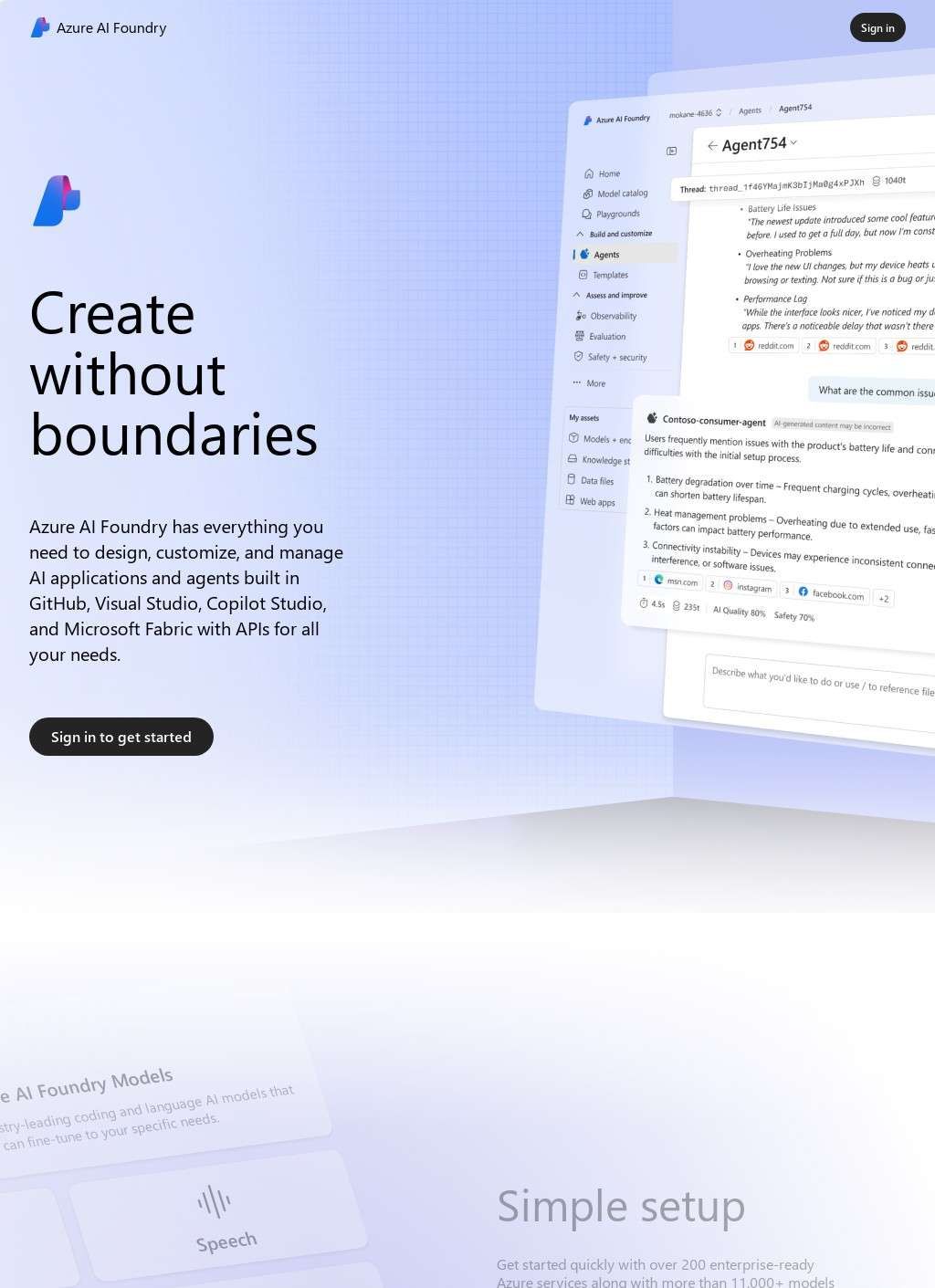Azure AI Foundry operates as Microsoft's comprehensive platform for enterprise AI development, designed specifically for organizations that need to build, deploy, and manage AI applications at scale while maintaining strict governance and security standards. The platform combines Microsoft's extensive AI research with enterprise-grade infrastructure, offering developers access to both cutting-edge models and proven enterprise services. Unlike consumer-focused AI platforms, Azure AI Foundry addresses the complex requirements of large organizations, including compliance, data privacy, integration with existing systems, and long-term support commitments. The platform serves as both a development environment and a production runtime for AI applications.
The platform's model catalog represents one of the most comprehensive collections of AI models available from a single provider, featuring offerings from Microsoft, OpenAI, Meta, Mistral, Cohere, and numerous other providers. This includes everything from small language models optimized for specific tasks to large multimodal models capable of handling text, images, and audio simultaneously. The catalog allows developers to compare models using standardized benchmarks, test them with their own data, and switch between different options without changing their application code. This flexibility proves especially valuable for organizations that need to balance performance, cost, and specific capability requirements.
Azure AI Foundry's agent development capabilities distinguish it from simpler AI platforms by providing tools for building complex, multi-step AI applications that can work autonomously while maintaining human oversight. The Agent Service handles orchestration, state management, and tool integration, allowing developers to create AI agents that can access enterprise data sources, call external APIs, and coordinate with other systems. These agents can be deployed across Microsoft 365 applications, integrated with business processes through Logic Apps, or embedded in custom applications. The platform includes templates and pre-built connectors for common enterprise scenarios.
Security and governance features are built into every layer of the platform, reflecting Microsoft's focus on enterprise requirements and regulatory compliance. The platform integrates with Microsoft Entra for identity management, provides role-based access controls, and includes comprehensive audit logging for AI interactions. Content filtering and responsible AI guardrails help prevent inappropriate outputs, while data encryption and network isolation protect sensitive information. For organizations in regulated industries, the platform provides compliance certifications and tools for demonstrating adherence to various regulatory frameworks.
The platform's integration with the broader Microsoft ecosystem creates unique advantages for organizations already using Microsoft technologies. Developers can leverage existing Active Directory identities, integrate with SharePoint and Microsoft 365 data sources, and use familiar development tools like Visual Studio and GitHub. Azure AI Foundry also works with Microsoft Fabric for data integration and Power Platform for low-code development, creating a comprehensive environment where AI capabilities can be embedded throughout an organization's existing workflows and applications.
Pricing and deployment flexibility address the diverse needs of enterprise customers, from experimental projects to large-scale production deployments. The platform offers pay-as-you-go pricing for development and testing, reserved capacity for predictable workloads, and on-premises deployment options for organizations with strict data residency requirements. Microsoft provides detailed cost estimation tools and spending controls to help organizations manage AI expenses effectively. For large enterprises, custom pricing and support arrangements ensure that the platform can scale to meet even the most demanding requirements.
Development tools and SDKs provide multiple ways to interact with the platform, accommodating different developer preferences and technical requirements. The web-based portal offers visual tools for model experimentation and agent building, while SDKs for Python, .NET, Java, and JavaScript enable programmatic access for developers who prefer code-first approaches. The platform includes prompt flow for orchestrating complex AI workflows, evaluation tools for testing model performance, and monitoring capabilities for tracking production applications. Integration with Azure DevOps enables AI applications to follow the same deployment and governance processes as other enterprise software.
Support and professional services help organizations navigate the complexities of enterprise AI adoption, from initial planning through production deployment and ongoing optimization. Microsoft provides architectural guidance, best practices documentation, and hands-on support for complex implementations. The platform includes extensive documentation, tutorials, and reference architectures for common enterprise scenarios. For organizations that need additional expertise, Microsoft partners and professional services teams can provide implementation assistance, custom development, and ongoing support. Regular updates and feature releases ensure that the platform continues to evolve with the rapidly changing AI landscape while maintaining stability for production workloads.
